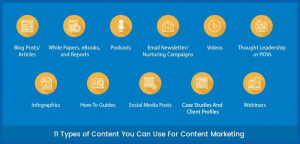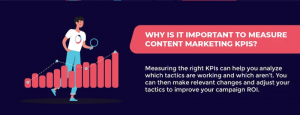Are you aware of the term “currency of the internet”? The currency of the internet is “Content” and brands must concentrate on producing a wide variety of good meaningful content to engage its target audiences, reach new audiences or geographies. Content is also a powerful tool to add value to the consumers and attract new prospects.
However, with so many various forms of content available, it can be challenging for brands to decide which one to prioritize. There are also limitations on creating and curating content, these could be domain or industry specific, some require details that are evolving and frequently updated and some have limitations based on type, platform and outreach.
Each content type has its own significance and impact. That is why as a brand marketer or promoter, it is very important to understand the widely used popular content types. This article will help you in understanding how you can use KPIs to promote growth,
Various Types of Content.
Let us understand the popular content types together with the categories of content marketing that they fall under.
Types of Contents
Written Content
Blog Post- Blogs are high-quality written works about a specific subject. A blog post can be a listicle, checklist, how-to guide, or any other long-form material. Blog postings improve your website’s search engine rankings and shareability, but having a blog that covers industry-specific issues can build your brand’s competence and authority in your relevant business and help you earn your consumers’ trust.
Frequently Asked Questions (FAQ)- Your website’s FAQ section can help you increase prospective sales. You can respond to inquiries about your field, goods, services, product solutions and more. These are beneficial for prospective customers, but they can also save your staff time by lowering the number of routine inquiries they receive.
User-Generated Content- User-generated material is excellent since it gives potential customers the required social proof and is free. Try to include at least some user-generated content in your content plan, whether you utilize Instagram to showcase people wearing or using your product or to gather customer success stories to share on your website.
Other examples of user-generated content include pictures, demos, video testimonies, live discussions etc.
Visual Content
Images:
Images are the most frequently used visual content type. An image can quickly convey your point whereas a block of text might as well be ignored. On websites like Flickr and Photobucket, you may find free stock photography images, but it is always recommended to conceptualize and create original images to make your social media and blog articles more memorable, generate original images.
Video:
Do you know the average weekly time that individuals view web videos? Roughly 16 hours! This is a 52% increase over the previous few years. At least 86% of consumers will encounter more brand video content in 2022.
Videos are among the most engrossing content-type genres. They immediately pick the audience’s interest. Videos can be produced with educational, entertainment, or informational goals in mind. One of the most popular platforms for sharing and viewing videos online is YouTube.
Memes:
Funny photographs with clever captions gave rise to the revolution known as memes. Meme culture is so prevalent that it’s difficult to keep up with it because this kind of stuff spreads so quickly. They are best characterized as images whose main purpose is to vividly convey a scene. One of the most popular content types for viral marketing.
Interactive Content
Polls:
The main purpose of conducting online polls is to record audience sentiment. They let businesses and organizations get feedback, perhaps speeding up decision-making. Polls also allow for audience participation and give a boost to engagement.
Audio Content
Podcasts: Podcasts are fast gaining popularity. As per statista.com, Revenue is expected to show an annual growth rate (CAGR 2022-2027) of 6.38% in the music, radio and podcast segment. This is expected to result in a projected market volume of US$2,027.00m by 2027.
A podcast is a sort of audio programming that often consists of a series of episodes and has one or more recurrent hosts covering a specific topic or current event. Podcasts are fantastic since they are portable and simple to consume. They don’t require much of your time or attention because you can download and listen to them on your phone while doing other things.
Now that we have covered various types of content marketing options, let us understand the need for assessing and evaluating the key performance indicators for each.
Importance of tracking KPIs for each content type
The main advantage of monitoring content marketing KPIs is that they help you determine whether your content material is producing the desired results. It enables you to determine whether your material is seen, interacted with, and resonated with by your target audience. Tracking KPIs can also help you in knowing whether you are using the right distribution channel for your content and if your audience is finding it valuable.
How to choose relevant KPIs for your content?
The most often monitored indicators for content performance are email engagement, website traffic, and website interaction, according to a 2020 Content Marketing Institute B2B study. All of these measures should be monitored, but they might not be directly related to your campaign’s objectives. How do you then locate the best candidates for your campaigns?
For this sole purpose, it is crucial to have a clear idea of what you want to achieve from your contents. You may match your content marketing goals with the appropriate measurements and KPIs once you’ve established clear objectives.
List your objectives and connect them to the KPIs that pertain to them. Four main campaign goals:
- Amplify brand awareness
- Produce more leads
- Boost conversion rates
- Boost interest
These four KPIs can be effectively used as per the content type.
KPIs by Content Type
| KPIs | Blog Posts/ Articles |
Social Media posts | Videos | Podcasts | PPC Campaigns |
|
| Website Traffic | TRUE | FALSE | FALSE | FALSE | FALSE | FALSE |
| Unique visitors | TRUE | FALSE | FALSE | FALSE | FALSE | FALSE |
| New Vs. returning visitors | TRUE | FALSE | FALSE | FALSE | FALSE | FALSE |
| Time on site | TRUE | FALSE | FALSE | FALSE | FALSE | FALSE |
| Avg. time on page | TRUE | FALSE | FALSE | FALSE | FALSE | FALSE |
| Bounce rate | TRUE | FALSE | FALSE | FALSE | FALSE | FALSE |
| Exit rate | TRUE | FALSE | FALSE | FALSE | FALSE | FALSE |
| Page views | TRUE | FALSE | FALSE | FALSE | FALSE | FALSE |
| Page views per visit | TRUE | FALSE | FALSE | FALSE | FALSE | FALSE |
| Traffic sources | TRUE | FALSE | FALSE | TRUE | FALSE | FALSE |
| Geographical trends | TRUE | FALSE | FALSE | FALSE | FALSE | FALSE |
| Mobile visitors | TRUE | FALSE | FALSE | FALSE | FALSE | FALSE |
| Desktop visitors | TRUE | FALSE | FALSE | FALSE | FALSE | FALSE |
| Visits per channel | TRUE | FALSE | FALSE | FALSE | FALSE | FALSE |
| Open rate | FALSE | TRUE | FALSE | FALSE | FALSE | FALSE |
| Conversion rate | FALSE | TRUE | TRUE | FALSE | FALSE | TRUE |
| Opt-out rate | FALSE | TRUE | FALSE | FALSE | FALSE | FALSE |
| Subscribers | FALSE | TRUE | FALSE | TRUE | TRUE | FALSE |
| Churn rate | FALSE | TRUE | FALSE | FALSE | FALSE | FALSE |
| Click-through rate | FALSE | TRUE | FALSE | TRUE | FALSE | FALSE |
| Delivery rate | FALSE | TRUE | FALSE | FALSE | FALSE | FALSE |
| Amplification rate | FALSE | FALSE | TRUE | FALSE | FALSE | FALSE |
| Return on engagement | FALSE | FALSE | TRUE | FALSE | FALSE | FALSE |
| Post reach | FALSE | FALSE | TRUE | FALSE | FALSE | FALSE |
| Views | FALSE | FALSE | FALSE | TRUE | FALSE | FALSE |
| Unique viewers | FALSE | FALSE | FALSE | TRUE | FALSE | FALSE |
| Applause rate | FALSE | FALSE | TRUE | FALSE | FALSE | FALSE |
| Followers/Fans | FALSE | FALSE | TRUE | FALSE | FALSE | FALSE |
| Avg. view duration | FALSE | FALSE | FALSE | TRUE | FALSE | FALSE |
| Landing page conversion | FALSE | FALSE | TRUE | FALSE | FALSE | FALSE |
| YouTube CTA click-through | FALSE | FALSE | FALSE | TRUE | FALSE | FALSE |
| Shares | FALSE | FALSE | FALSE | TRUE | TRUE | FALSE |
| Comments | FALSE | FALSE | FALSE | TRUE | FALSE | FALSE |
| Backlinks | FALSE | FALSE | FALSE | FALSE | TRUE | FALSE |
| Downloads | FALSE | FALSE | FALSE | FALSE | TRUE | FALSE |
| Reviews/ratings | FALSE | FALSE | FALSE | FALSE | TRUE | FALSE |
| Cost per click | FALSE | FALSE | FALSE | FALSE | FALSE | TRUE |
| Ad position | FALSE | FALSE | FALSE | FALSE | FALSE | TRUE |
| Conversions | FALSE | FALSE | FALSE | FALSE | FALSE | TRUE |
| Cost per conversion | FALSE | FALSE | FALSE | FALSE | FALSE | TRUE |
| Cost per sale | FALSE | FALSE | FALSE | FALSE | FALSE | TRUE |
| Return on ad spend | FALSE | FALSE | FALSE | FALSE | FALSE | TRUE |
| Wasted spend | FALSE | FALSE | FALSE | FALSE | FALSE | TRUE |
| Impressions | FALSE | FALSE | FALSE | TRUE | FALSE | TRUE |
| Quality score | FALSE | FALSE | FALSE | FALSE | FALSE | TRUE |
| Total spend | FALSE | FALSE | FALSE | FALSE | FALSE | TRUE |
| Social shares | FALSE | FALSE | FALSE | FALSE | TRUE | FALSE |
The brand marketing world is ever-evolving and for every aspect of marketing automation – from content publishing, curating to even writing and sharing we have marketing automation tactics. Our brand strategists will assess your brand goals, target audience and competition before recommending a content or campaign strategy.
As an integrated branding agency, we make sure that all suitable types of content are explored and assessed for a brand to develop an effective online reputation and among the right audiences.
And there you have it: the various content types that can help your brand stand out. With 30TH FEB, you can take your content marketing strategy to the next level.
Begin with creating high-quality content and if you are keen to speak to a strategist drop us a line at ask@30thfeb.com or visit www.30thfeb.com


